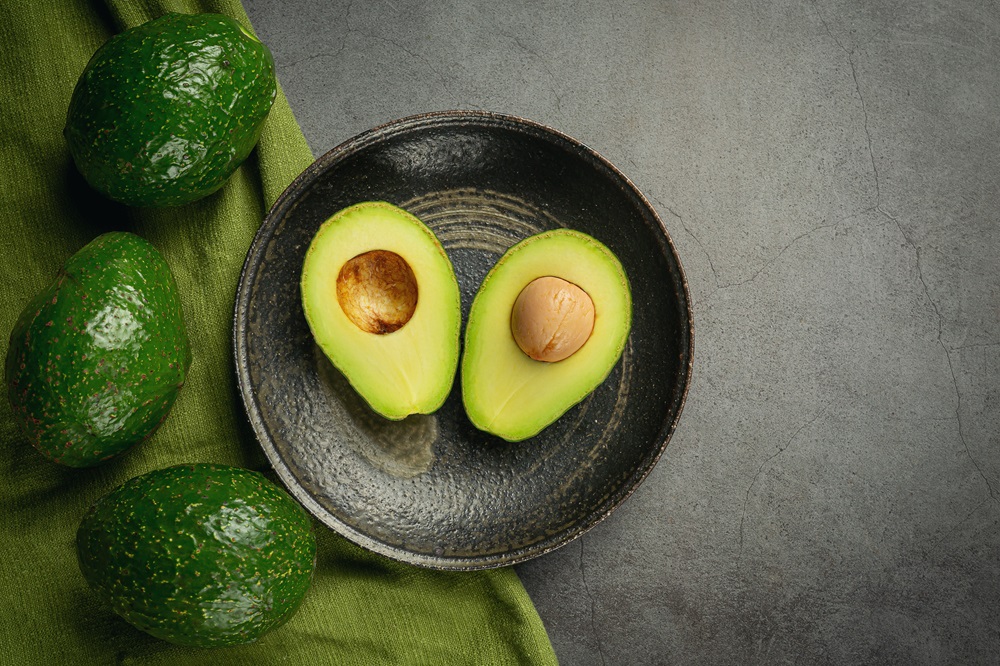Avocado – Nutrients, Benefits, and Recipe Ideas

Avocado is one of the most popular fruits in the world, valued for its richness in healthy fatty acids. It is a versatile ingredient that tastes great in both savory dishes and sweet desserts. How many calories does avocado have? What vitamins does it contain? What health benefits may it offer? What meals can you prepare with avocado?
Table of contents
Avocado - what is it?
Avocado (Persea americana), also known as the alligator pear, is an evergreen tree belonging to the laurel family. Originating from Mexico, it quickly spread to South America. Today, the largest producers are Mexico, Peru, and the Dominican Republic.
The avocado tree can grow 20-24 meters tall, with leathery, lance-shaped leaves. Its yellow-green flowers grow in clusters at the ends of branches. The fruit, known as the avocado or avocado pear, has a thick, green, bumpy skin. Inside is light-colored flesh and an inedible seed.
Two main varieties dominate the market - the popular Fuerte avocado, with glossy skin and a pear-like shape, and the increasingly common Hass avocado, which is smaller, oval-shaped, and has darker skin.
Avocado - nutritional value
Avocado is a high-energy fruit - 100 g provides about 160 kcal. It has a low glycemic index and load. The edible part, the flesh, is about 70% water. Avocado is a great source of healthy fats, especially monounsaturated fatty acids like oleic acid. One hundred grams contain around 15 g of healthy fats. It is also high in dietary fiber.
Avocado is rich in vitamins and minerals. It is an excellent source of potassium and also contains calcium, iron, magnesium, and phosphorus. It provides vitamin C, B vitamins (including thiamine, riboflavin, niacin, and folate), as well as vitamin K and vitamin E.
On top of that, avocado is a source of bioactive compounds such as carotenoids (lutein and zeaxanthin), phenolic acids, flavonoids, tannins, and coumarins.
Avocado - health benefits. Is avocado good for you?
Thanks to its valuable nutrients, avocado may have many health benefits. Research suggests it can improve blood lipid profiles, helping lower total cholesterol, LDL cholesterol, and triglycerides, while supporting cardiovascular health and reducing the risk of hypertension.
Studies indicate that avocado may improve cognitive function in seniors, benefiting memory, focus, and attention. It may also lower the risk of type 2 diabetes and help reduce fasting blood sugar in people with diabetes.
Because it is rich in healthy fats, avocado can enhance the absorption of fat-soluble compounds, such as carotenoids like lutein and zeaxanthin, which are important for eye health.
Avocado may also support skin health, helping regeneration, protecting against UV damage, and improving firmness and elasticity - potentially slowing the aging process.
For those on a weight-loss diet, avocado is a valuable food as it provides healthy fats and fiber, which increase satiety, support digestion, and may help with weight management.
Avocado - recipes. What to make with avocado?
Avocado can be eaten raw or used in both sweet and savory recipes. Fresh avocado works well in salads, smoothies, spreads, and guacamole. Avocado oil, rich in mono- and polyunsaturated fatty acids, can also be used in cooking to enhance flavor and support health.
Chocolate avocado cream
Ingredients: 1 avocado, 2 tbsp cocoa powder, 1 tbsp ground hazelnuts, 1 tbsp erythritol, 2 tbsp coconut milk.
Preparation: Wash and cut the avocado, scoop out the flesh, and place it in a blender. Add cocoa powder, hazelnuts, erythritol, and coconut milk. Blend until smooth. Serve chilled.
Spring avocado salad
Ingredients: 1 avocado, a handful of cherry tomatoes, a handful of fresh spinach, 1 mozzarella ball, a handful of strawberries, 2 tbsp avocado oil, 1 tbsp sunflower seeds.
Preparation: Wash, cut, and scoop the avocado flesh, then slice it. Put in a bowl. Halve the tomatoes and add them. Wash spinach and strawberries, slice strawberries, and add to the bowl along with sunflower seeds, avocado oil, and diced mozzarella. Mix well.
Avocado crepes
Ingredients: 1 cup whole-grain flour, 2 eggs, 1 cup low-fat milk, 4 tbsp canola oil, 1/2 cup sparkling water, 1 avocado, 100 g semi-fat cottage cheese, favorite seasonings.
Preparation: Mix flour, eggs, milk, oil, and sparkling water until smooth. Cook crepes on a non-stick pan. Wash, cut, and scoop avocado flesh, mash it with cottage cheese and seasonings. Spread the filling on the crepes and roll them up.
Green smoothie
Ingredients: 1 avocado, 1 celery stalk, 1 banana, 1 orange, a handful of fresh spinach, 100 ml low-fat milk.
Preparation: Wash, cut, and scoop the avocado flesh into a blender. Add chopped celery, peeled banana, and fresh orange juice. Add spinach and milk. Blend until smooth.
Chilled avocado soup
Ingredients: 2 avocados, 1 lime, 1/2 cucumber, 1/2 melon, 1/2 onion, 1 tsp fresh dill, 2 tbsp Greek yogurt.
Preparation: Wash, cut, and scoop avocado flesh into a blender. Add lime juice and blend until smooth. Peel and chop melon, cucumber, and onion, then add to the blender. Blend again, add yogurt, and process until creamy. Serve chilled with fresh dill.
Avocado - contraindications and side effects. Who should avoid it?
Avocado is generally safe, but people allergic to it may experience symptoms due to cross-reactions, especially those allergic to bananas, latex, or kiwi. Symptoms may include runny nose, cough, hives, tingling around the mouth, swelling, vomiting, and in rare cases, anaphylaxis.
Those with kidney disease should eat avocado with caution. It may also interact with blood-thinning medications, such as warfarin, by having an opposite effect, potentially increasing bleeding risk. People taking anticoagulants should limit avocado intake.

